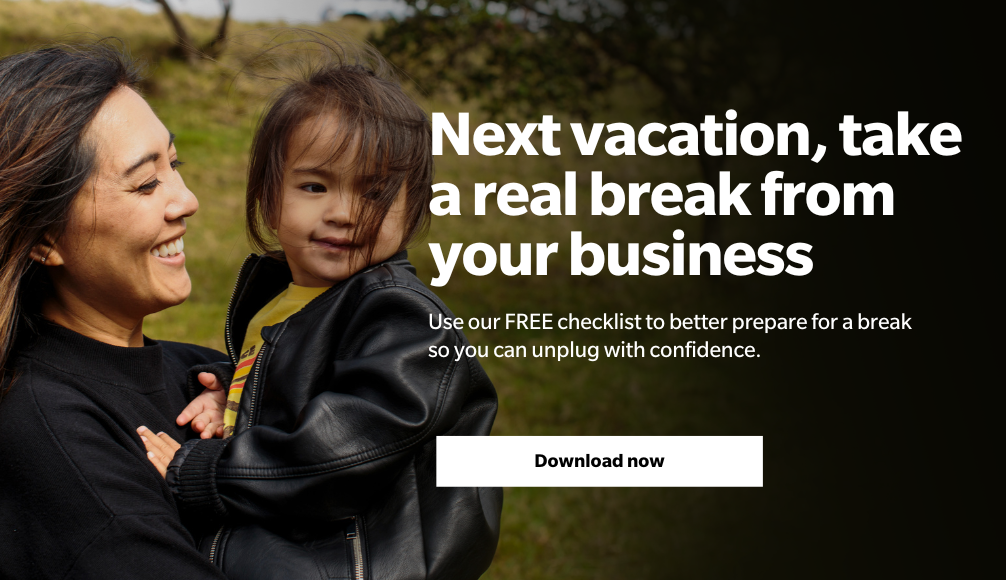In the last three years, we've seen such incredible shifts in workforce trends that the traditional model of five days in the office seems like a thing of the past. And among the conversations of how, where and when to work, talk of a shorter work week is slowly becoming louder. Even before the pandemic, companies around the world were starting to experiment with a modified workweek—and now many others are following suit, hoping to boost employee morale and productivity.
But one story still stands out to me. Back in 2019, Microsoft Japan made news with what was then still an unconventional move. For an entire month, Microsoft employees worked four (as opposed to five) days a week. And can you guess what happened to productivity that month? It went up by 40%.
A 40% increase—isn’t that amazing?
It really struck a chord with me because it supported something that we stress to our EMyth Clients all the time: Taking a break from your business is good for your business. This is especially true during the holidays, when you need to take the space to reset before you kick off a new year. Our clients are very receptive to restructuring their business so they can take a vacation (which I talk a bit about here) but continually struggle with why they should. And that's a really important distinction to make, because some owners block time off for a break, but deep down, they’re resistant. They feel like they don’t deserve it. They feel shame and guilt. They can’t free themselves, even mentally, from work to get the rest they need.
And that reasoning messes with your ability to do what’s right—for yourself, your family and your company.
If you want to grow your business into one that works independently of you, you sometimes have to let go of working in your business. Admittedly, this is hard to do when you’re stuck in the mindset that the success of the business rests on you, making it impossible escape the day-to-day Tactical Work. But a true entrepreneur knows there are huge personal benefits to stepping away—benefits that will directly impact the company. Here are four of them.
1. Recharge your body and mind
When you get in the habit of going into work every day and never break that cycle, you begin to lose your effectiveness as a leader—not because you’re not an effective leader, but because you can’t maintain the stamina needed for it. To be effective, you need to show up daily with a beginner’s mind and a fresh perspective. If you’re coming in day after day to the same thing, hustling just to keep the wheels turning, work will start to feel flat. You risk losing the spark that makes you great at what you do.
Bodies, hearts and minds need to recharge. It’s just as true for business owners as it is for everyone else. Recharging gives you the space and energy to really think about what you want your business and your life to look like.
In my years of coaching, I’ve found that many owners resist this idea. They get energy from working and feel like they need to be doing it all the time. Taking time off can cause listlessness or even anxiety. If this sounds like you, the holiday season is a perfect moment to restructure your life, to recharge through meaningful time with your loved ones and find your energy from a resource other than just your business.
2. Recreate how your business works
You started your business with an idea: a spark of creative inspiration, excitement and passion. But if you’re like many business owners, that space for creativity gets squashed by the pattern of the everyday, and the pressure to produce and build. As a result, you end up forever stuck in the same place, doing business tomorrow the way you’re doing it today. By getting away and returning to that creativity, you can access ideas that may otherwise be drowned out.
Yet there’s a risk when doing this at the end of the year. During this particular moment, you may feel a natural pressure to use this time to create a plan for next year. That way, it doesn’t feel like you’re wasting time. But I want to encourage you to change your mindset from planning to freely dreaming. Sure, we’re the first to propose that having a clear annual plan will set your team up for success next year. But don’t use your holiday break to this end. When you take off the pressure to build something during your vacation, ideas will come that you were never expecting.
Here’s what I’d love for you to try: Tell everyone you’re taking time off. Walk away from your desk and say, “I’ll see you in two weeks.” Don’t take home a bag of paperwork, your binders, your laptop. If you do that, it’s not truly a vacation or a time to recharge. Instead, get a blank notebook and have it nearby throughout your vacation. Because you know what’s going to happen when you get out of the structure of your routine? You’re going to crack open and ideas are going to come out—and you'll need to put all those down somewhere.
To reiterate, this is not about using your vacation time to make a list of things you want to fix in your business. This is about coming to a blank piece of paper with a beginner’s mind to ask yourself, “What if?” and documenting everything that comes up for you. The two may produce the same thoughts, but the place this comes from should be one of ideation, not necessity. If you allow your mind to go without restriction, the results will serve you and your business much better.
3. Reconnect with your company's purpose
Remember the day you started your business? You had a fire in your belly. You had an emotional connection to the business. You knew why you were doing it. Is your purpose still that clear?
Many of my clients started with a dream of providing for their family, of being the best father, mother, partner that they could be. For others, it was about making a difference or being successful in a way that nobody had before. They had a great idea that no one had ever thought of—one that could change the world—so they started a business to do that. For all of these owners, their business became a vehicle for their dreams.
Owners who never take the time they need from the business can start to lose their sense of purpose. They aren’t the same people they were when they started their business, having lost the emotional connection to their purpose along the way. Remember, running a business is kind of like running a marathon. If you don’t stop part way through to drink some water or eat a protein bar, you’ll burn out or lose steam. A vacation offers you the opportunity to tap back into your purpose and even take it farther. Staying aligned with your “why” is the best way to build your business for long-term success.
4. Gain clarity
Having distance from your company allows you to see it for what it really is, for better or for worse. On one hand, you can see more clearly what you’re most grateful for as a business owner. Maybe it’s your amazing employees. Maybe it’s the life your business creates for you, or the way it functions as your vehicle to leave your stamp on the world. And even though it can be overwhelming while you’re in it, your work is still a positive force in your life.
But you may also experience the other side, where you finally have the space to breathe and think, “Is this really what I want to be doing with my life?” Distance allows you to be more honest with yourself, to be inquisitive and let the answer reveal itself to you.
Wherever your thoughts lead, really going through the process of looking at what your business gives (and demands of) your life can help you get clearer on what changes you need to make.
So please—take some time for yourself over the holidays this year to recharge and reconnect with why you started this journey in the first place.
Your business will be better for it. And we’re here to help.




Comments